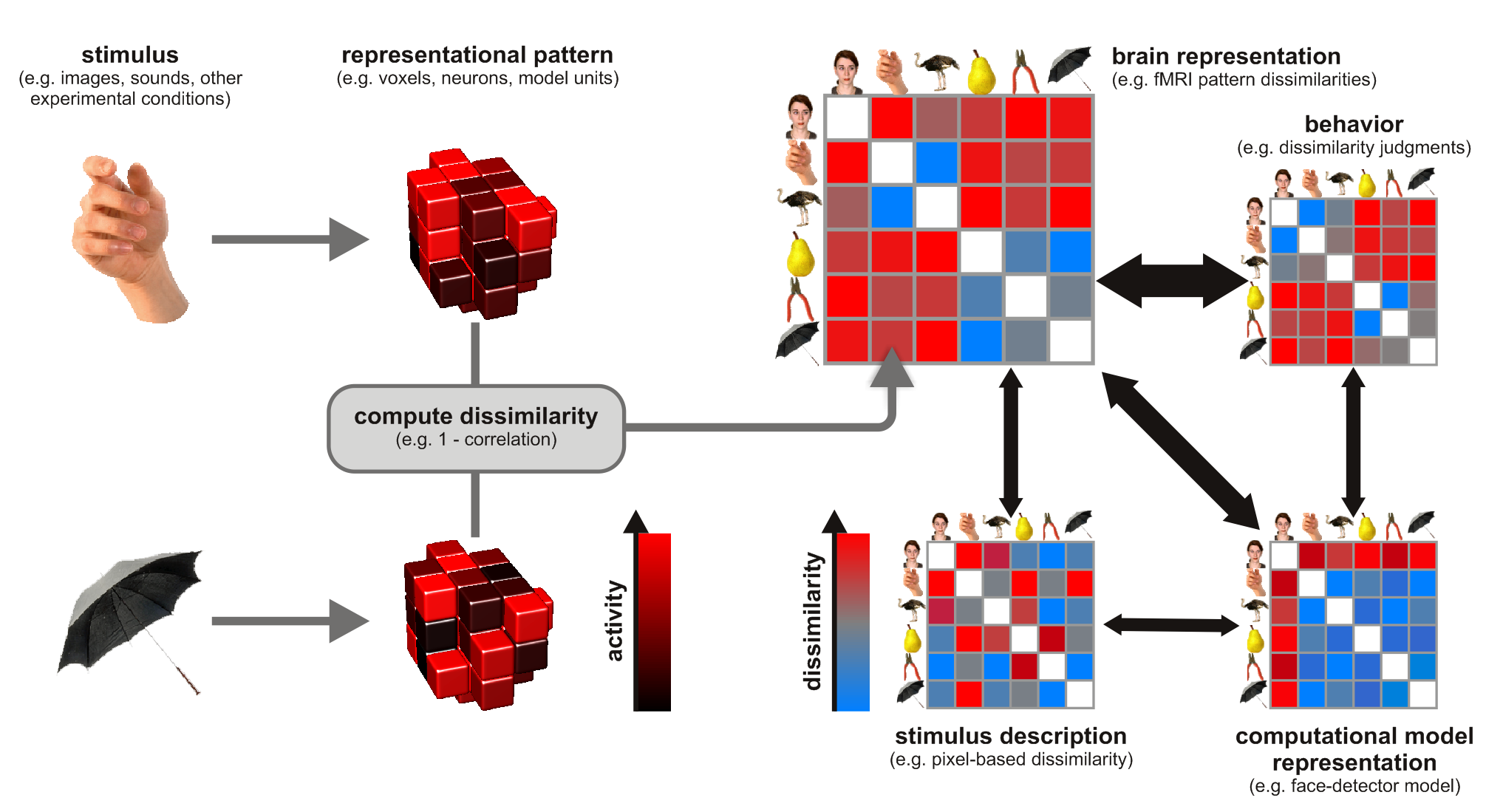Cambridge Representational Similarity Analysis Workshop
February 16-17, 2015 at the Medical Research Council Cognition and Brain Sciences Unit
(15 Chaucer Road, Cambridge CB2 7EF, UK)
Please note that you can no longer sign up to this event through this page due to the registration period ending.

For details, see Kriegeskorte & Kieviet (2013).
Workshop organisers: Alexander Walther, Hamed Nili, Saika Parveen, Jörn Diedrichsen, Nikolaus Kriegeskorte
Instructors: Jörn Diedrichsen, Hamed Nili, Nikolaus Kriegeskorte, Alexander Walther, Naveed Ejaz
Brief description: This two-day workshop will provide an in-depth introduction and advanced discussion of the current state-of-the-art in representational similarity analysis (RSA). It will cover the full range of methods from data-driven visualisations to inferential model comparisons. There will be talks on basic and advanced methods, shorter talks on recent neuroscientific applications, hands-on practicals, and audience-initiated specialised discussions. The workshop will be suitable for participants from different disciplines at all levels of research experience. The methods are applicable to representations throughout the brain (e.g. vision, audition, memory, attention, emotion, language, and motor control) and to all modalities of brain-activity measurement. Most of the applications discussed will be in human neuroimaging (in particular, fMRI and MEG).
Content for beginners: Beginners will learn the basics of RSA and perform a full set of analyses on simulated data on their own laptops during the practicals. All relevant scripts will be provided to the participants.
Content for advanced users: Advanced users will learn about pattern-component modelling; the linear-discriminant t value; sensitivity, reliability, and bias of various distance measures; remixing and reweighting of representational spaces; links between RSA, pattern decoders, and population receptive-field modelling; time-resolved dynamic MEG-based RSA; and the relationship between RSA, distance correlation, kernel methods, and mutual information.
Prerequisites: Experience with some modality of brain-activity measurement (fMRI, recordings, ECog, EEG/MEG) and analysis of brain-activity data. Basic statistics. Some knowledge of programming. Some familiarity with linear algebra and Matlab is additionally desirable.
Preliminary schedule: The schedule can be found here.
Cost contribution: We expect the cost of the workshop to require a contribution of £40/person for students and £80/person for nonstudents. This will include coffee, tea, and lunch on both days and will help cover printing and travel expenses for the speakers. We are seeking a subsidy for the workshop, which might enable us to offer the workshop free of charge or to issue waivers to junior applicants who could not otherwise afford participation.
Registration: Registration is open until 30 November 2014. To register for the workshop, please fill in the webform below. Please be aware that the number of places is limited by the size of our seminar room and hands-on workshop facilities. Applications will be accepted on a first-come, first-served basis. We will confirm your place by December 15, 2014.
Practicals: For hands-on participation in the practicals, participants will need to bring laptops with Matlab installed and will need to have downloaded the RSA toolbox from here. In case you cannot bring a laptop with Matlab installed, please let us know by emailing us at rsa2015@mrc-cbu.cam.ac.uk.
Accommodation: Participants will be responsible for making their own accommodation arrangements. The following websites may be helpful:
http://www.visitcambridge.org/accommodation
http://www.universityrooms.com/en/city/cambridge/home?gclid=CNeZm_nvn8ECFUXnwgodoQUA3Q
Contact information: If you have any enquiries about the Cambridge RSA workshop, please email us at rsa2015@mrc-cbu.cam.ac.uk.
Videos from the event: Videos are now available to stream and can be found here.
Slides from the event: Slides to accompany the videos can be found on the video page using the above link.
Key references:
[toggle hide=”yes” border=”yes” title_open= “Introductory methods” title_closed=”Introductory methods”] [/toggle] [toggle hide=”yes” border=”yes” title_open= “Advanced methods” title_closed=”Advanced methods”]Aguirre GK (2007) Continuous carry-over designs for fMRI. NeuroImage, 35, 1480-1494.
[/toggle] [toggle hide=”yes” border=”yes” title_open= “Neuroscientific applications” title_closed=”Neuroscientific applications” ]
[/toggle]
Registration Form
Please note that you can no longer sign up to this event through this page due to the registration period ending.

 MRC Cognition and Brain Sciences Unit
MRC Cognition and Brain Sciences Unit

